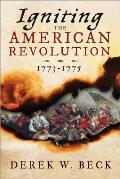Beck’s Blow-by-Blow Analysis
A century after Frank Warren Coburn shared his conclusions about which town militia companies fought the British troops at the Battle of Lexington and Concord, Derek W. Beck produced a new analysis.
Coburn sorted out the action by the towns where fighting occurred. In Igniting the American Revolution, 1773–1775, Beck focused more closely on individual skirmishes. Here’s his analysis about which towns’ companies joined the fighting and where.
Another town Coburn listed as taking part in the battle but Beck found no place for is Newton. Coburn wrote that three Newton companies joined the fight at Lexington, citing mainly Samuel F. Smith’s town history.
Smith gave a lot of space to a narrative passed down in the Jackson family, which actually says the Newton men started fighting in Concord and carried on all the way to when the redcoats got into their boats at Lechmere’s Point in Cambridge—which never happened.
However, Smith and another local historian, Francis Jackson, also printed a story about Capt. Jeremiah Wiswall’s company, how his seventy-five-year-old father insisted on marching along, and how the old man was shot in the hand. I quoted those passages back here.
It strikes me as potentially significant that two of the Newton companies said they “Marched from Newton to head quarters at Cambridge” while the third, Capt. Wiswall’s, went “upon the Alarm in Newton to Lexington.” That third muster roll includes “Mr. Noah Wiswall,” the captain’s father. Contemporaneous accounts do list Noah Wiswall among the wounded provincials.
All told, I therefore lean toward including Capt. Wiswall’s Newton company among the units that actually engaged the British troops in either east Lexington or west Cambridge. I’m not sure about the other two seeing combat, and the muster rolls contradict the Jackson family tradition.
[Full disclosure: I’m from Newton.]
Coburn sorted out the action by the towns where fighting occurred. In Igniting the American Revolution, 1773–1775, Beck focused more closely on individual skirmishes. Here’s his analysis about which towns’ companies joined the fighting and where.
- North Bridge (Concord): Concord, Acton, Bedford, Lincoln
- Meriam’s Corner (Concord): Billerica, Chelmsford, Reading
- Brook’s Tavern/Hill (still Concord): Framingham, Sudbury
- “Bloody Angle” (Lincoln): Woburn
- “Parker’s Revenge” (Lincoln/Lexington line): Lexington
- Fiske Hill (Lexington): Cambridge
- Menotomy (then Cambridge, now Arlington): Menotomy, Medford, Malden, Lynn, Beverly, Danvers
- Watson’s Corner (Cambridge): Brookline, Roxbury, Dedham, Needham
From the committee, he took a cross road to Watertown, the British being in possession of the Lexington road. At Watertown, finding some militia who had not marched, but applied for orders, he sent them down to Cambridge, with directions to take up the planks, barricade the south end of the bridge, and there to take post; that, in case the British should, on their return, take that road to Boston, their retreat might be impeded.Watertown had an unusually large number of men under Capt. Samuel Barnard, so it’s possible some of them went into the fight on the north side of the Charles while others held the bridge. But Col. Percy avoided any confrontation at the river by turning east from Cambridge toward Charlestown. (Beck suggests the Watertown men might have then come up from the bridge to fight.)
Another town Coburn listed as taking part in the battle but Beck found no place for is Newton. Coburn wrote that three Newton companies joined the fight at Lexington, citing mainly Samuel F. Smith’s town history.
Smith gave a lot of space to a narrative passed down in the Jackson family, which actually says the Newton men started fighting in Concord and carried on all the way to when the redcoats got into their boats at Lechmere’s Point in Cambridge—which never happened.
However, Smith and another local historian, Francis Jackson, also printed a story about Capt. Jeremiah Wiswall’s company, how his seventy-five-year-old father insisted on marching along, and how the old man was shot in the hand. I quoted those passages back here.
It strikes me as potentially significant that two of the Newton companies said they “Marched from Newton to head quarters at Cambridge” while the third, Capt. Wiswall’s, went “upon the Alarm in Newton to Lexington.” That third muster roll includes “Mr. Noah Wiswall,” the captain’s father. Contemporaneous accounts do list Noah Wiswall among the wounded provincials.
All told, I therefore lean toward including Capt. Wiswall’s Newton company among the units that actually engaged the British troops in either east Lexington or west Cambridge. I’m not sure about the other two seeing combat, and the muster rolls contradict the Jackson family tradition.
[Full disclosure: I’m from Newton.]

